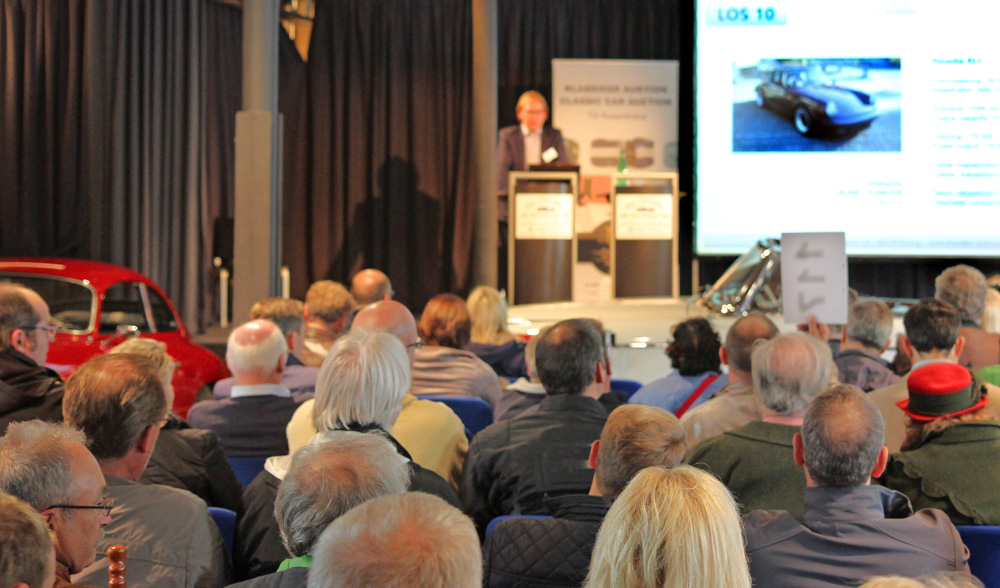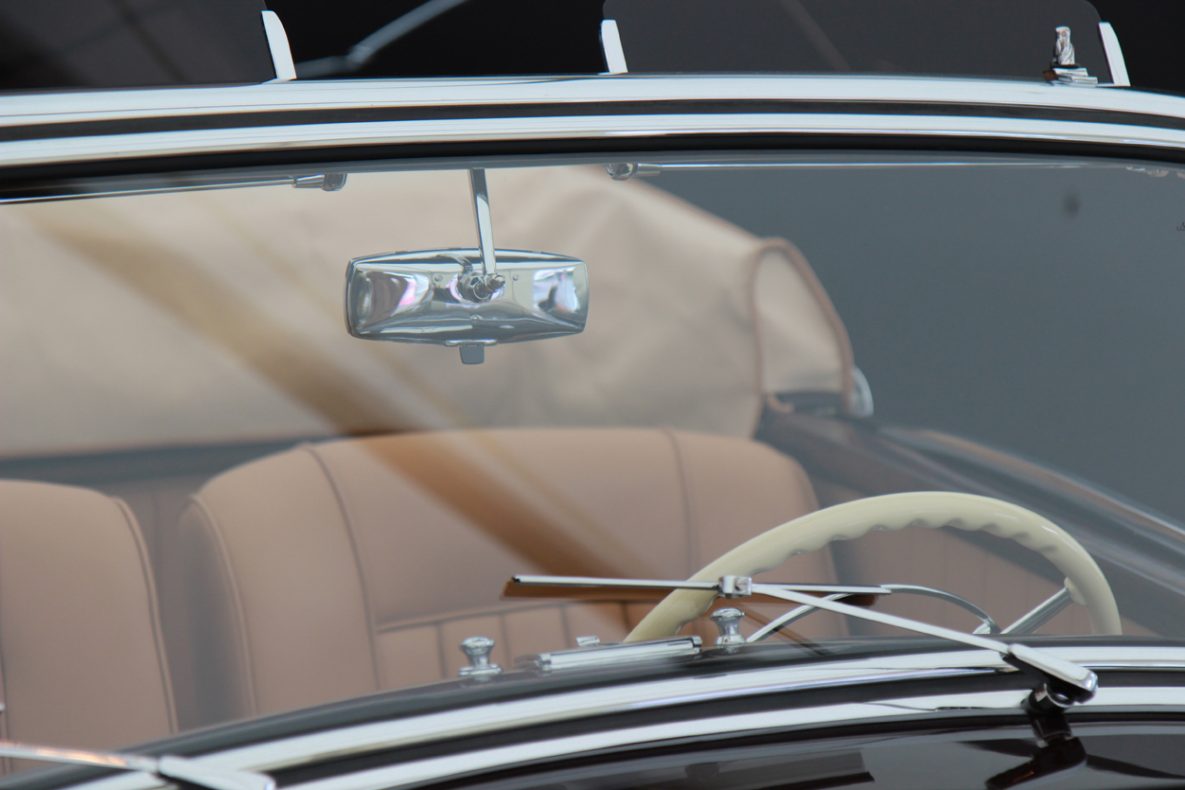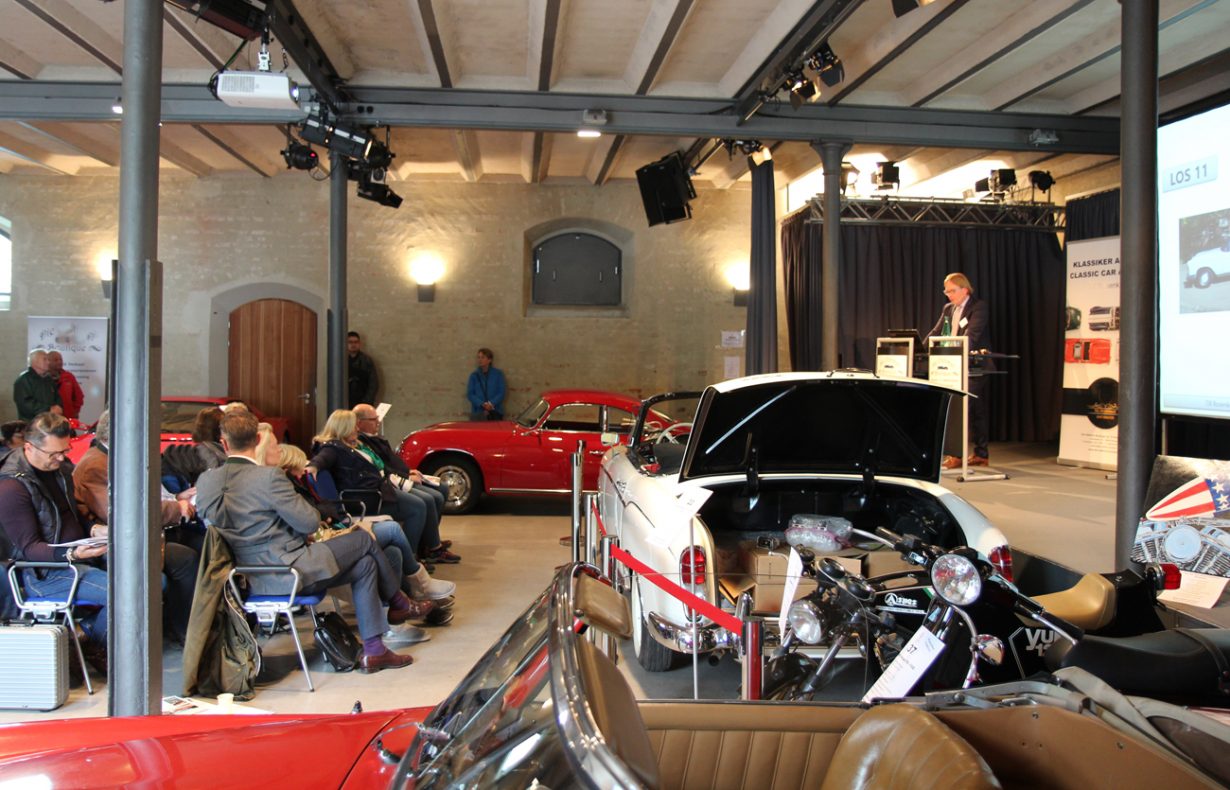
Classic car law: What should be legally observed at a classic car auction in Germany
In classic car auctions, very good prices can sometimes be achieved, whether for the consignor or for the buyer. This is because, in contrast to private sales via classic car websites on the Internet or via the relevant classic car magazines, the price at a classic car auction is determined within a few minutes and depends heavily on the group of participants. According to consistent case law of German courts, auction results are therefore not representative of the market value of the lots, says German attorney (Rechtsanwalt) Dr. Louis Rönsberg, who represents clients in classic car law. But what is legally important for the consignor and the bidder when auctioning classic cars in Germany?

Who is the contracting party of the vintage car sales contract
For the consignor or bidder in a classic car auction, it is first of all of interest whether the auctioneer is acting on behalf of the consignor or on commission. In the case of the agency model, the purchase contract for the classic car is concluded with the consignor, whereas in the case of the commission model, it is concluded with the auction house. What does this mean for the parties involved? If, for example, the classic car is wholly or partially a forgery or if the vehicle has other defects (e.g. higher total mileage, accident damage), the buyer in the agency transaction must stick to the consignor, who is unknown to him. In the case of a commission transaction, on the other hand, the known auction house owes proper fulfillment of the purchase contract. In contrast, only in the case of an agency transaction does the consignor have his own enforceable claim for payment against the successful bidder. In the case of commission business, he must first rely on the auction house duly fulfilling its obligations under the agency agreement with regard to the purchase price claim.
Whether the auctioneer acts on commission or on behalf of the consignor in a classic car sale should be regulated in the auction house’s terms and conditions. If the auctioneer acts according to his terms and conditions “in the name and for the account of the consignor”, it is a representation in the sense of § 164ff. BGB. If, on the other hand, the auction house acts “in its own name and for the account of a third party”, this is a commission transaction within the meaning of § 383 para. 1 HGB. Then, in addition to the contractual conditions, the rules of the German Commercial Code (HGB) on commission business (§§ 383 ff. HGB) also apply, unless they have been effectively waived. In the experience of German attorney (Rechtsanwalt) Dr. Louis Rönsberg, however, the auction conditions are often contradictory, unclear or simply illegal in whole or in part. In these cases, an interpretation is required to determine who should actually be the seller of the classic car. If it remains unclear whether the auctioneer intended to auction the classic car in his own name or on behalf of the consignor, the sale is in his own name according to the interpretation rule of Section 164 (2) of the German Civil Code.
Consignor conditions in Germany
When concluding the so-called consignment contract or auction order, the consignor of a classic car should pay attention to whether the contract grants the auction house a right to a so-called “private sale” after an unsuccessful auction and under what conditions this may take place. If the consignor does not wish to participate in the post-auction sale, he should make this clear in the contract. This is because the auction house usually pays the production costs for the auction catalog and, in the case of auctions at classic car fairs, the rent for the auction room, etc., in advance and therefore wants to earn a commission if possible. The consignor, on the other hand, may not be interested in offering his classic car in a post-sale, as he wants to profit from the price-increasing effect of the auction atmosphere and a bidding war.
Some classic car auction houses charge the consignor a consignment fee to cover the costs of the auction from the outset, irrespective of the success of the sale. In this regard, too, the auction order or consignment contract should be read thoroughly by the consignor. Finally, it should be determined precisely whether the auction house, in addition to the buyer’s commission, the so-called “buyer’s premium”, should also be entitled to demand a seller’s commission or consignor’s commission from the consignor in the event of a successful sale of the classic car, which is referred to as the “consignment fee”. Which commissions are to be paid by whom and what amount they should have, can of course be freely negotiated with the classic car auctioneer within the framework of the consignment contract, provided that the auction house engages in this negotiation and does not refer blanketly to the general rules in its auction conditions. The more interesting the classic car and the higher the expected hammer price, the more likely the auctioneer will be willing to negotiate with regard to commissions, since his costs for the auction usually remain the same.

Acquisition of classic cars in good faith in Germany
German law differentiates between ownership and possession. For example, in the case of car rental, the lessor remains the owner and only cedes possession to the lessee. If an vintage car has been stolen from the owner, has been missing or has been lost in any other way, it cannot actually be acquired in good faith by third parties under German law (Section 935 (1) of the German Civil Code). This can be different if the classic car was auctioned. This is because ownership of lost property can be acquired by way of exception at auctions if certain criteria are met. For this, however, the auction must be a “public auction” within the meaning of § 935 para. 2 BGB and the auctioneer must have a permit pursuant to § 34b GewO. Most vintage car auctions take place through an appropriately appointed auctioneer, so that ownership can then also be effectively obtained in stolen goods, provided the auctioneer was in good faith, according to German attorney (Rechtsanwalt) Dr. Louis Rönsberg. However, an Internet auction in the sense of eBay is not a “public auction” in the legal definition due to the lack of an auctioneer.
Applicable law for classic car auctions
Many large and interesting classic car auctions take place abroad, for example at RM Auctions, as the classic car partner of Sotheby’s calls itself, Christies, Bonhams, Coys, or Barrett-Jackson, which annually auction around 1,600 vehicles in Arizona within 10 days before the eyes of around 400,000 visitors. Classic car auctions are also held at many classic car events in England, France or the USA, such as Retromobile in Paris, Monterey Car Week in Pebble Beach or Goodwood in West Sussex. If one buys a classic car at such an auction through a local auction house, the law of the respective country applies to the purchase contract without any problems. But what happens if an auction house based abroad holds an auction in Germany? First of all, the question arises as to which contractual conditions the auction house uses. If, for example, these are typical English “Conditions of Business” which contain a choice of law clause according to which British law is to apply, the question arises as to whether these have been effectively included in the purchase contract.
In the experience of German lawyer Dr. Louis Rönsberg, it is often permissible in other countries, for example, to provide the general terms and conditions or auction conditions in font size 6 or smaller, which has led to the term “small print”. However, according to the case law of German courts, GTCs must be easily readable by an average customer, without the need for a magnifying glass. But is the German Federal Court of Justice’s (BGH) opinion at all authoritative in this regard? After all, in the example case, the auction conditions precisely stipulate the law of England? Yes, the BGH is authoritative, because according to its case law, a choice-of-law and choice-of-court clause in general terms and conditions may not be relied upon if it is precisely a question of their coming into existence. In this case, the auction conditions would therefore not have been effectively included in the classic car purchase contract.
But which law applies if the auction conditions are invalid? This is determined by private international law and, within the European Union, usually by the rules of the so-called “Rome I Regulation”. If the contract is concluded between the auction house acting as an entrepreneur and a consumer, Article 6 of the Rome I Regulation must be observed. According to its first paragraph, such a contract is subject to the law of the country in which the consumer has his habitual residence, provided that the entrepreneur carries out a professional or commercial activity in this country. This will already be the case for an auction house if it rents premises abroad and accepts consignments there or concludes commission agreements. If the entire auction takes place in the country concerned, this is certainly the case. German civil law would therefore be applicable to the auction, even if the auction house actually wanted to auction the classic car under British law.
Estimate and reserve prices in Germany
It is common practice for estimated prices within a certain range to be given in the auction catalog. These are intended to give the prospective bidder an indication of the market value of the classic car. In practice, however, auction houses often strategically set this value too high or too low for individual lots. Too low, in order not to scare off interested parties from the outset and to create the impression that one can make a bargain here. This makes the auction results look better, since the difference between the estimated price and the hammer price is regularly higher. Too high to fool the bidder into believing that the item has a higher market value and to shift the price determination frame upwards from the outset. The prospective buyer is therefore well advised not to rely on the stated estimated prices but, if possible, to form his own opinion of the actual market value of the classic car or to consult an expert. The consignor, on the other hand, should make sure that the limit is set at a level he can live with. Otherwise, he may be obliged by the knockdown to transfer his classic car for what he considers to be far too low a purchase price.
But what applies under German law if no minimum price or limit is specified when the classic car is consigned? In its ruling of 22.09.1983, the Kammergericht Berlin (Berlin Court of Appeal) stated that an auctioneer may not sell off the auctioned item, even if the consignor has not specified a minimum price. Section 384 (1) of the German Commercial Code (HGB) also provides that a commission agent is obliged to “carry out the accepted transaction with the diligence of a prudent businessman” and that he must “safeguard the interests of the principal in doing so”. However, an obligation of the auctioneer to point out to a consignor upon conclusion of an auction contract the risk of an auction without fixing a minimum price was rejected by the OLG Düsseldorf in its decision of May 19, 2009. However, if it is agreed in an auction contract that a bid is to be accepted only if the bid is not more than 10% below a previously determined “reasonable” estimated price, it is said to constitute a breach of duty on the part of the auctioneer vis-à-vis the consignor if he does not determine an estimated price at all prior to the auction.

Knock down and reservation under German law
Section 7 of the German Auction Regulations stipulates that the auctioneer may only accept the bid if no overbid has been submitted after the highest bid has been repeated three times. However, this provision is more of a recommendation, as it is not subject to sanctions. Is a bidder who had tactically considered bidding on the classic car only after the second call disadvantaged? No, because under German auction law, a bidder is generally not entitled to a knockdown, even if he is the highest bidder. This also applies if the auction conditions state in general terms that the highest bidder will be awarded the bid. This is because, according to German case law, the bidder can also recognize that the auctioneer has an interest in refusing to accept the bid, for example because he is aware of the lack of liquidity of the highest bidder or because a limit set by the vendor has not been reached. There is therefore no entitlement to a knockdown by the highest bidder in a classic car auction in Germany.
The auction conditions of classic car auction houses in Germany usually stipulate that the auctioneer can also knock down lots subject to reservation. In the auction catalog, the corresponding lots are then usually marked with the words “reserve”. But even if uncertainties arise shortly before the auction with regard to the condition of the classic car or the ownership situation, in practice the knockdown is usually made subject to the reservation that these uncertainties are cleared up, according to German lawyer Dr. Louis Rönsberg. Finally, a knockdown subject to reservation is also common if a limit specified in the auction catalog, i.e. a minimum price, has not been reached. The validity of the purchase contract then depends on whether the consignor later accepts or rejects the bidder’s purchase offer.
From a legal point of view, the auctioneer can unilaterally extend the acceptance period for the bidder’s contractual offer through the reservation he declares. Unilaterally because the auction conditions of many classic car auctioneers in Germany expressly stipulate that the bidder remains bound to his bid for a precisely defined or at least “reasonable” period of time. A period of four weeks was deemed reasonable by the Higher Regional Court of Frankfurt. In contrast, the Saarbrücken Higher Regional Court considered eight weeks to be too long and the corresponding provision in the auction conditions to be invalid. Without a corresponding provision in the terms and conditions of auction, the acceptance of the bid subject to reservation does not constitute a contract either. However, the bidder is then also not bound by his contractual offer.
Defects and exclusion of liability
For the bidder, the main advantage of a classic car auction is that a whole range of vehicles are offered for sale in one place within a short period of time. In addition, classic cars are sometimes particularly cheap at auctions, provided that no other auction participant is interested in the lot and the limit has been set very low. The main disadvantage of a classic car auction for the buyer is that he only has limited opportunities to inspect the vehicle during the preview. Test drives or even just starting the engine are often prohibited and some auction houses do not like it if the prospective bidder looks for repairs with a magnet or coating thickness gauge. In this case, the bidder has no choice but to rely on the accuracy of the information in the auction catalog and the vehicle documents (service booklet, checkbook, etc.) and the verbal statements of the auctioneer with regard to mileage, previous owners, absence of accidents or original condition. Some classic car dealers take advantage of this special feature of auction sales to sell questionable vehicles without the need for a thorough inspection by the buyer.
But what can be done if the buyer discovers after the auction that the classic car has a significantly higher mileage or another defect as a result of a speedometer manipulation or that it is even a fake or a replica? In the experience of German lawyer Dr. Louis Rönsberg, the auction conditions of most auction houses in Germany stipulate that the descriptions of the vehicle in the auction catalog are non-binding and do not constitute an assurance or even an assumption of warranty. Nevertheless, the buyer may be entitled to a warranty for material defects if the classic car is not “suitable for normal use” or does not have the “quality that is customary for items of the same type and that the buyer can expect” (§ 434 Para. 3 No. 1 and 2 BGB). It should also be noted that many auction houses have also generally excluded their liability for damages. Whether this exclusion of liability is effective should be determined on a case-by-case basis by a lawyer specializing in classic car law or auction law.

Conclusion
A classic car auction offers a number of advantages for the seller and the buyer, but also involves considerable risks. In addition to the uncertainties arising from the fact that the classic cars can only be inspected to a limited extent during the preliminary inspection and cannot be test-driven, in the experience of German lawyer Dr. Louis Rönsberg, it is above all legal risks that the vendor and the bidder should clarify and reduce before the auction if possible. The consignment and auction conditions should be checked to determine whether they are effective at all, with whom a purchase contract is concluded in the event of a successful bid, which fees and commissions are owed, whether the auctioneer should be entitled to a private sale in the subsequent sale and to what extent liability for material defects of the classic car is excluded.
If you have any questions about classic car law in Germany or classic car auctions and the costs associated with legal action, German lawyer (Rechtsanwalt) Dr. Louis Rönsberg and his team will be happy to help. Call us without obligation! (+49-89-51 24 27 0).
Author of the article

Dr. Louis Rönsberg
Rechtsanwalt (Lawyer), Partner
Certified Specialist Lawyer for Banking and Capital Market Law
(Fachanwalt für Bank- und Kapitalmarktrecht)
Certified Specialist Lawyer for Corporate and Commercial Law
(Fachanwalt für Handels- und Gesellschaftsrecht)











